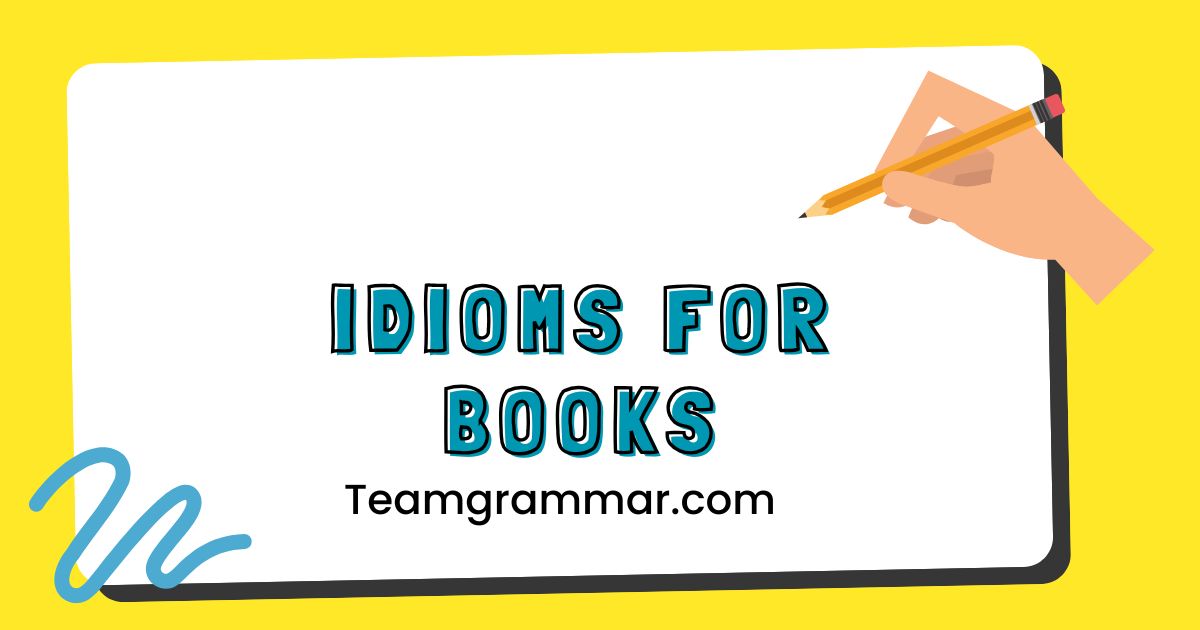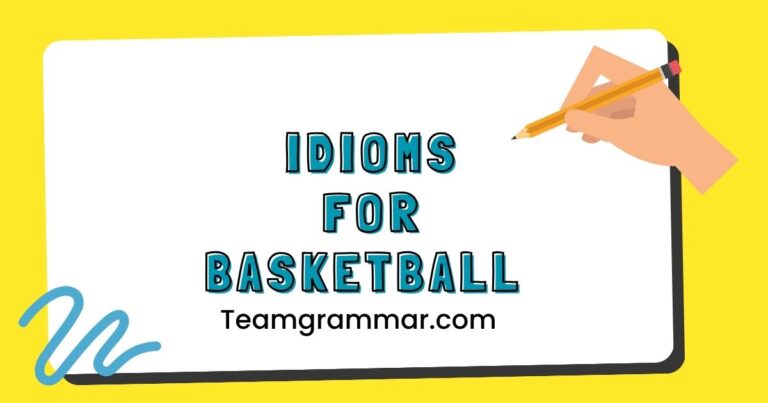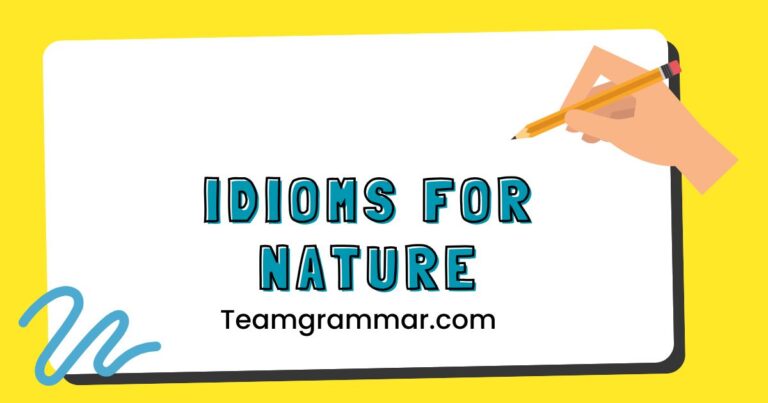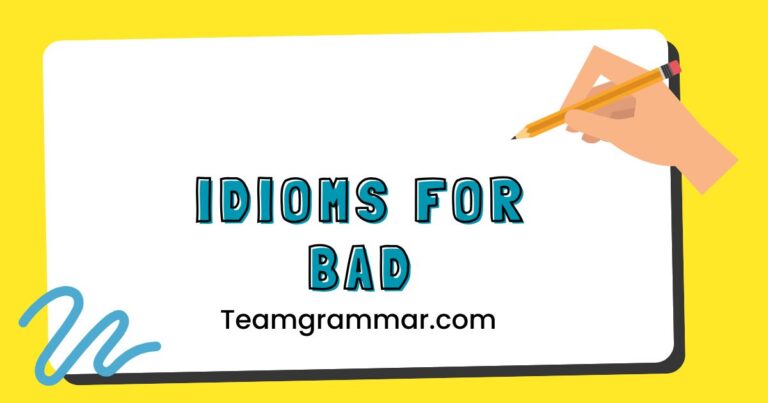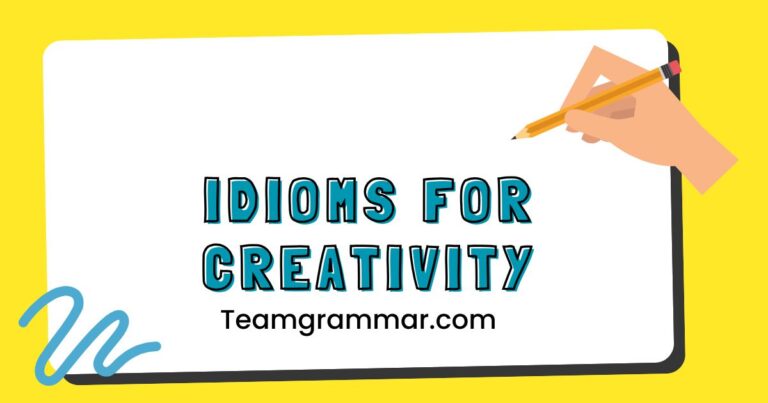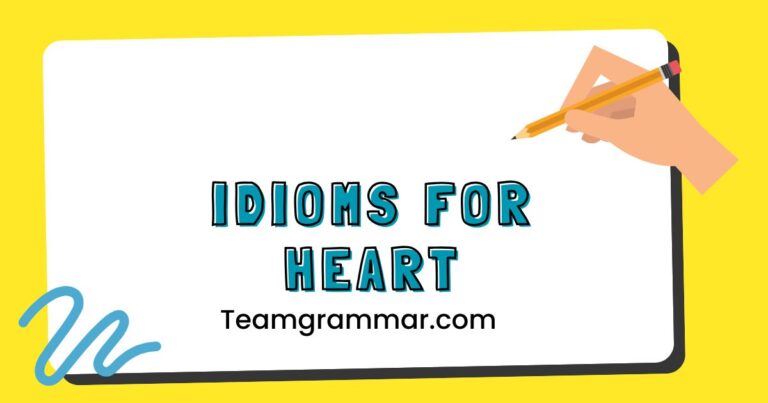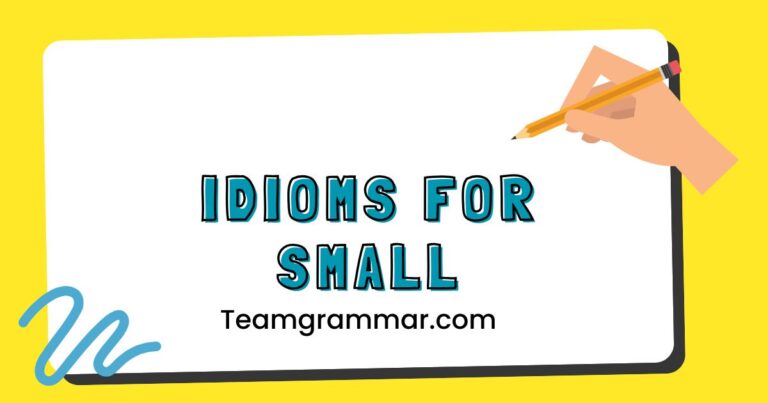46 Idioms for Books: Mastering Literary Expressions
Understanding idioms related to books can significantly enhance your comprehension and appreciation of English literature and everyday conversation. These figurative expressions offer a colorful and nuanced way to describe reading experiences, writing processes, and the impact of stories.
This article explores a wide range of idioms associated with books, providing definitions, examples, and practical exercises to improve your command of the English language. Whether you’re a student, a teacher, or simply a book lover, this guide will deepen your understanding of these common yet often misunderstood expressions.
By mastering these idioms, you’ll be able to express yourself more vividly and accurately in both written and spoken English.
Table of Contents
- Introduction
- Definition of Book Idioms
- Structural Breakdown
- Types and Categories of Book Idioms
- Examples of Book Idioms
- Usage Rules
- Common Mistakes
- Practice Exercises
- Advanced Topics
- FAQ
- Conclusion
Definition of Book Idioms
An idiom is a phrase or expression whose meaning cannot be understood from the ordinary meanings of the words in it. Instead, the phrase has a figurative meaning known through common use.
Book idioms are idioms that relate to books, reading, writing, and the world of literature. These expressions often use metaphors and similes to convey complex ideas or emotions in a concise and memorable way.
Understanding these idioms is essential for interpreting literature, engaging in literary discussions, and enhancing your overall language proficiency.
Book idioms can be classified based on their function and context. Some idioms describe the plot or storyline of a book, while others focus on the characters, themes, or writing style.
Additionally, some idioms relate to the act of reading itself, such as the experience of getting lost in a book or finding a book enlightening. Recognizing these categories can help you understand and use these idioms more effectively.
Structural Breakdown
The structure of book idioms varies widely, but they typically consist of a combination of nouns, verbs, adjectives, and prepositions. They often rely on metaphorical language, creating an image or analogy that conveys a specific meaning.
For example, the idiom “to read between the lines” uses the image of reading to suggest understanding the hidden or implied meaning. Similarly, “to turn over a new leaf” uses the image of turning a page in a book to symbolize making a fresh start.
Understanding the grammatical structure of these idioms can help you identify and interpret them more easily. Many idioms follow common sentence patterns, but their figurative meaning requires a deeper understanding of the context and cultural references.
Recognizing the underlying structure can also help you use these idioms correctly in your own writing and speech. Furthermore, paying attention to the individual words within the idiom and their literal meanings can offer clues to the idiom’s overall figurative meaning.
Types and Categories of Book Idioms
Plot-Related Idioms
Plot-related idioms describe the storyline or events within a book. These idioms often convey the complexity, excitement, or predictability of a narrative.
They can also refer to plot twists, climaxes, and resolutions.
Character-Related Idioms
Character-related idioms describe the personalities, actions, or development of characters in a book. These idioms often use metaphors to convey character traits or relationships.
They can also refer to character arcs, motivations, and flaws.
Writing-Related Idioms
Writing-related idioms describe the process of writing a book, including the challenges, inspiration, and techniques involved. These idioms often use imagery related to creativity, revision, and publication.
They can also refer to writer’s block, plot development, and editing.
Reading-Related Idioms
Reading-related idioms describe the experience of reading a book, including the emotions, thoughts, and insights gained. These idioms often use metaphors to convey the impact of a book on the reader.
They can also refer to different reading styles, preferences, and habits.
General Book Idioms
General book idioms encompass a wide range of expressions related to books, literature, and the world of reading. These idioms often refer to the importance of books, the power of storytelling, and the value of knowledge.
They can also be used in various contexts to convey broader ideas or emotions.
Examples of Book Idioms
The following tables provide extensive examples of book idioms, organized by category. Each example is accompanied by a definition and a sample sentence to illustrate its usage.
These examples will help you understand the meaning and context of each idiom, enabling you to use them effectively in your own communication.
Plot-Related Idioms Examples
The table below showcases plot-related idioms, explaining their meanings and providing example sentences to illustrate how they are used in context. Understanding these idioms can help you discuss and analyze the structure and events of a story more effectively.
| Idiom | Definition | Example Sentence |
|---|---|---|
| Turn the page | To start a new chapter or phase in life. | After the disappointing ending, she decided to turn the page and start a new project. |
| A page-turner | A book that is so exciting that you want to keep reading it. | The mystery novel was a real page-turner; I couldn’t put it down until I finished it. |
| Cliffhanger | An ending to a section, chapter, or book that leaves the reader in suspense. | The episode ended on a cliffhanger, leaving viewers eager to know what happens next. |
| The plot thickens | The story becomes more complicated or mysterious. | As more characters were introduced, the plot thickened, and it became harder to predict the outcome. |
| Jump the shark | The point when something (like a TV show or book series) starts to decline in quality. | Many fans felt the series jumped the shark when they introduced time travel. |
| Write a new chapter | To start a new phase or experience in life. | After retiring, he decided to write a new chapter by volunteering abroad. |
| By the book | Following the rules strictly. | The detective always did things by the book, never bending the rules. |
| Read someone like a book | To understand someone’s thoughts and feelings easily. | She had known him for so long that she could read him like a book. |
| An open book | Someone who is easy to understand and doesn’t hide their feelings. | He’s always been an open book, sharing his thoughts and emotions freely. |
| Close the book on | To end something completely. | After years of debate, they decided to close the book on the issue. |
| In black and white | In writing or print, clear and unambiguous. | The contract stated everything in black and white, leaving no room for interpretation. |
| Dog-eared | Having the corners of the pages turned down through much use. | His favorite book was dog-eared from being read so many times. |
| Lost in the pages | Completely engrossed in reading. | She was so lost in the pages of the novel that she forgot about dinner. |
| Unfold the story | To reveal or develop the narrative. | The author slowly unfolded the story, revealing secrets one by one. |
| A chapter of accidents | A series of unfortunate events. | The trip turned into a chapter of accidents, with missed flights and lost luggage. |
| Turn the tables | To reverse the situation and gain an advantage. | The underdog managed to turn the tables in the final round. |
| Out of the book | Unconventional or extraordinary. | His ideas were so out of the book that they seemed impossible at first. |
| Hit the books | To study hard. | I need to hit the books if I want to pass the exam. |
| Cook the books | To falsify financial records. | The accountant was accused of cooking the books to hide the company’s losses. |
| By its cover | Judging something based on its appearance. | You can’t judge a book by its cover; you need to read it to understand it. |
| Take a leaf out of someone’s book | To imitate someone’s actions or behavior. | He decided to take a leaf out of his mentor’s book and be more assertive. |
| Sing from the same hymn book | To agree or have the same opinions. | The team needs to sing from the same hymn book to achieve their goals. |
Character-Related Idioms Examples
The following table provides examples of character-related idioms, offering insights into how to describe and analyze characters within a story. These idioms capture the essence of character traits and relationships in a concise and memorable way.
| Idiom | Definition | Example Sentence |
|---|---|---|
| A character straight out of a book | Someone who seems like they belong in a fictional story, often eccentric or unique. | He was a character straight out of a book, with his quirky habits and outlandish stories. |
| Larger than life | Someone who is more impressive or exciting than ordinary people. | The actor was larger than life, captivating audiences with his charismatic performance. |
| A cardboard character | A character that is not well-developed or realistic. | The villain was a cardboard character, lacking depth and motivation. |
| True to character | Consistent with someone’s typical behavior. | His reaction was true to character; he always overreacts in stressful situations. |
| Out of character | Not behaving as one normally does. | It was out of character for her to be so quiet and withdrawn. |
| The hero of the hour | Someone who saves the day or performs a heroic act. | He became the hero of the hour by rescuing the trapped cat from the tree. |
| The villain of the piece | The person responsible for the trouble or problem. | In this situation, he’s portrayed as the villain of the piece, even though he had good intentions. |
| A tragic figure | A character who suffers a great misfortune or downfall. | Hamlet is often seen as a tragic figure, doomed by his own flaws and circumstances. |
| A flawed character | A character with imperfections or weaknesses. | Audiences often connect with flawed characters because they seem more relatable. |
| A dynamic character | A character who undergoes significant change or development. | The protagonist is a dynamic character, evolving throughout the course of the story. |
| A static character | A character who remains the same throughout the story. | The sidekick is a static character, providing comic relief without changing much. |
| A round character | A complex character with multiple traits and motivations. | The novel features several round characters, each with their own unique backstory and desires. |
| A flat character | A simple character with few traits and little depth. | The minor characters are often flat characters, serving a specific purpose in the plot. |
| A pivotal character | A character who plays a crucial role in the story’s development. | The witness is a pivotal character, holding the key to solving the mystery. |
| A stock character | A stereotypical character that appears frequently in literature. | The wise old mentor is a stock character found in many fantasy stories. |
| A foil character | A character who contrasts with another character to highlight their qualities. | The antagonist serves as a foil character to the protagonist, emphasizing their differences. |
| An unreliable narrator | A narrator whose credibility is compromised. | The story is told by an unreliable narrator, leaving the reader to question the truth. |
| A sympathetic character | A character who evokes feelings of empathy or compassion. | The protagonist is a sympathetic character, facing numerous challenges and hardships. |
| An unsympathetic character | A character who does not evoke feelings of empathy or compassion. | The antagonist is an unsympathetic character, driven by greed and selfishness. |
| Chapter and verse | Give detailed information about something. | He could quote chapter and verse about the history of the town. |
Writing-Related Idioms Examples
The following table presents writing-related idioms, providing a colorful way to describe the writing process, challenges, and successes. Understanding these idioms can enrich your discussions about writing and literature.
| Idiom | Definition | Example Sentence |
|---|---|---|
| Hot off the press | Newly printed and available. | The author’s new book is hot off the press and already topping the bestseller lists. |
| Write off | To consider something a failure or loss. | The project was written off after several unsuccessful attempts. |
| In a nutshell | In a concise and brief manner. | In a nutshell, the story is about a young girl who discovers her magical powers. |
| Get the lead out | To start doing something with energy and enthusiasm. | The team needs to get the lead out and start working harder to meet the deadline. |
| On the same page | In agreement or understanding. | It’s important for everyone to be on the same page before making any major decisions. |
| Put pen to paper | To start writing. | He finally decided to put pen to paper and start writing his memoirs. |
| The pen is mightier than the sword | Words and writing are more powerful than violence. | As a journalist, she believed that the pen is mightier than the sword. |
| Paint a picture | To describe something vividly. | The author painted a picture of the bustling city with her descriptive prose. |
| Draw a blank | To be unable to remember something. | I tried to recall his name, but I drew a blank. |
| Go back to the drawing board | To start over from the beginning. | After the experiment failed, they had to go back to the drawing board. |
| Read the room | To understand the mood or atmosphere of a situation. | He failed to read the room and made an inappropriate joke. |
| Get your wires crossed | To misunderstand each other. | We must have got our wires crossed; I thought you were bringing the drinks. |
| Dot the i’s and cross the t’s | To pay attention to every detail. | It’s important to dot the i’s and cross the t’s when filling out legal documents. |
| In print | Published in a book, newspaper, or magazine. | His articles have appeared in print in several major publications. |
| Out of print | No longer available for sale. | The book is out of print, but you might be able to find a used copy online. |
| Get something in writing | To obtain a written agreement or confirmation. | Make sure you get the terms in writing before signing the contract. |
| Take notes | To write down important information. | She always takes notes during lectures to help her remember the key points. |
| The long and short of it | The main point or summary. | The long and short of it is that we need to find a solution quickly. |
| Spill the beans | To reveal a secret. | He accidentally spilled the beans about the surprise party. |
| Tell tales out of school | To reveal secrets or gossip. | She’s always telling tales out of school, so you can’t trust her with confidential information. |
Reading-Related Idioms Examples
The table below lists idioms that describe the act of reading and the impact books can have on individuals. These expressions reflect the emotional and intellectual connections we form with literature.
| Idiom | Definition | Example Sentence |
|---|---|---|
| Couldn’t put it down | A book that is so interesting that you can’t stop reading it. | The novel was so captivating that I couldn’t put it down until I finished it. |
| Get lost in a book | To become completely absorbed in reading. | She loves to get lost in a book on a rainy afternoon. |
| Read between the lines | To understand the hidden or implied meaning. | You have to read between the lines to understand what he really means. |
| Take something as gospel | To believe something is completely true. | Don’t take everything he says as gospel; he’s known to exaggerate. |
| Read someone’s mind | To know what someone is thinking. | I wish I could read her mind to know what she really thinks of my idea. |
| Read up on something | To research and learn about a topic. | I need to read up on the latest developments in artificial intelligence. |
| Learn by rote | To memorize something through repetition. | He had to learn the poem by rote for the recitation. |
| A quick read | A book that can be read quickly and easily. | This short story is a quick read, perfect for a lunch break. |
| A heavy read | A book that is difficult to read or understand. | The philosophical text was a heavy read, requiring a lot of concentration. |
| Skim through | To read something quickly without paying attention to details. | I only had time to skim through the report before the meeting. |
| Delve into | To explore something in depth. | She decided to delve into the history of ancient civilizations. |
| Digest information | To understand and process information. | It takes time to digest all the information presented in the lecture. |
| Brush up on | To review or improve one’s knowledge of a subject. | I need to brush up on my Spanish before the trip to Mexico. |
| Hit the books | To study hard. | With exams approaching, it’s time to hit the books. |
| Burn the midnight oil | To work or study late into the night. | He had to burn the midnight oil to finish the project on time. |
| Pick up a book | To start reading a book. | I like to pick up a book when I have some free time. |
| Under one’s own steam | Achieve something by your own effort. | She finished the project under her own steam, without any help from others. |
General Book Idioms Examples
This table contains general idioms related to books, literature, and knowledge. These expressions can be used in a variety of contexts to convey broader ideas and concepts.
| Idiom | Definition | Example Sentence |
|---|---|---|
| An old flame | A former lover. | She ran into an old flame at the coffee shop. |
| A closed book | A subject or person that is difficult to understand. | Quantum physics is a closed book to me; I can’t make sense of it. |
| Like water off a duck’s back | Having no effect on someone. | Criticism rolls like water off a duck’s back for him; he doesn’t care what people say. |
| Call it a day | To stop working on something. | After working for ten hours, they decided to call it a day. |
| Once in a blue moon | Very rarely. | He visits his hometown once in a blue moon. |
| Bury the hatchet | To make peace after a conflict. | After years of feuding, they decided to bury the hatchet and become friends again. |
| Cut to the chase | To get to the point quickly. | Let’s cut to the chase; what do you really want? |
| The elephant in the room | An obvious problem that no one wants to discuss. | The company’s financial troubles were the elephant in the room during the meeting. |
| Get something off your chest | To express something that has been bothering you. | I need to get something off my chest; I’ve been feeling guilty about lying to you. |
| In the same boat | In the same situation. | We’re all in the same boat when it comes to dealing with this difficult project. |
| Keep something under your hat | To keep something secret. | I’m going to keep this under my hat until the official announcement. |
| Let the cat out of the bag | To reveal a secret accidentally. | He let the cat out of the bag about the surprise party, ruining the surprise. |
| Miss the boat | To miss an opportunity. | He missed the boat by not investing in the stock when it was cheap. |
| On the ball | Alert and competent. | She’s always on the ball and ready to tackle any challenge. |
| Piece of cake | Something that is easy to do. | The exam was a piece of cake; I finished it in no time. |
| See eye to eye | To agree with someone. | They don’t always see eye to eye on political issues. |
| Spill the beans | To reveal a secret. | He accidentally spilled the beans about the surprise party. |
| Take with a grain of salt | To not completely believe something. | You should take his advice with a grain of salt; he’s not always right. |
| The best of both worlds | A situation where you can enjoy two different opportunities. | Working from home offers the best of both worlds: flexibility and a comfortable environment. |
| Through thick and thin | During good times and bad times. | They’ve supported each other through thick and thin. |
Usage Rules
Using idioms correctly requires understanding their specific meanings and contexts. It’s important to avoid literal interpretations and to consider the figurative meaning of the phrase.
Idioms should be used appropriately in both formal and informal settings, depending on the context and audience.
When using idioms, pay attention to their grammatical structure and ensure that they fit seamlessly into your sentences. Avoid mixing idioms or altering their wording, as this can change their meaning or make them nonsensical.
Additionally, be aware of regional variations in idiom usage, as some idioms may be more common in certain dialects or countries.
Consider the tone and style of your writing or speech when using idioms. While idioms can add color and expressiveness to your language, overuse can make your communication sound cliché or unnatural.
Use idioms sparingly and strategically to enhance your message without overwhelming your audience. Moreover, be mindful of cultural sensitivities and avoid using idioms that may be offensive or inappropriate in certain contexts.
Common Mistakes
One common mistake is interpreting idioms literally, which can lead to misunderstandings and miscommunication. For example, someone might think “hit the books” means to physically strike books, rather than to study diligently.
Another mistake is using idioms incorrectly in a sentence, such as altering the wording or mixing idioms together.
Another common mistake is using idioms in inappropriate contexts, such as formal writing or professional presentations. While idioms can add color to informal communication, they may not be suitable for more serious or academic settings.
It’s important to consider your audience and purpose when deciding whether to use idioms.
Finally, many learners struggle with idiomatic expressions due to a lack of exposure and practice. To avoid these mistakes, it’s essential to read widely, listen to native speakers, and actively practice using idioms in your own writing and speech.
Correcting these errors will significantly improve your fluency and accuracy in English.
Correct vs. Incorrect Examples:
| Incorrect | Correct | Explanation |
|---|---|---|
| He hit the book literally. | He hit the books to prepare for the exam. | “Hit the books” means to study hard, not to physically hit books. |
| She was between a rock and a hard place and a pickle. | She was between a rock and a hard place. | Do not mix idioms. The correct idiom is “between a rock and a hard place,” meaning in a difficult situation. |
| The long and short of the tall tale is… | The long and short of it is… | “The long and short of it” is the correct idiom, not “the long and short of the tall tale.” |
Practice Exercises
These practice exercises will help you reinforce your understanding of book idioms. Complete each exercise and check your answers against the solutions provided.
These exercises cover a range of difficulty levels, allowing you to test your knowledge and improve your skills.
Exercise 1: Fill in the Blanks
Choose the correct idiom from the list to complete each sentence:
(a page-turner, read between the lines, hit the books, turn the page, hot off the press)
| Question | Answer |
|---|---|
| 1. The new mystery novel is a real ________; I couldn’t put it down. | a page-turner |
| 2. After a difficult breakup, she decided to ________ and start a new chapter in her life. | turn the page |
| 3. With exams just around the corner, it’s time to ________ and study hard. | hit the books |
| 4. The politician’s speech seemed straightforward, but you had to ________ to understand his true intentions. | read between the lines |
| 5. The latest edition of the magazine is ________ and available in bookstores now. | hot off the press |
| 6. He always does things _________ , never bending the rules. | by the book |
| 7. She is an _________ ; you can easily understand her feelings and thoughts. | open book |
| 8. After the scandal, they decided to _________ on the matter. | close the book |
| 9. The detective was able to _________ and solve the mystery. | unfold the story |
| 10. The trip turned into a _________ , with one problem after another. | chapter of accidents |
Exercise 2: Matching
Match the idiom to its definition:
| Idiom | Definition | Answer |
|---|---|---|
| 1. Out of character | a. To stop working on something | 1-d |
| 2. Call it a day | b. Very rarely | 2-e |
| 3. See eye to eye | c. To get to the point quickly | 3-f |
| 4. Piece of cake | d. Not behaving as one normally does | 4-g |
| 5. Once in a blue moon | e. To agree with someone | 5-b |
| 6. Cut to the chase | f. To stop working on something | 6-c |
| 7. An open book | g. Something that is easy to do | 7-h |
| 8. Spill the beans | h. Someone who is easy to understand and doesn’t hide their feelings. | 8-i |
| 9. Take a leaf out of someone’s book | i. To reveal a secret | 9-j |
| 10. By its cover | j. To imitate someone’s actions or behavior. | 10-k |
| 11. Get lost in a book | k. Judging something based on its appearance | 11-l |
| 12. Learn by rote | l. To become completely absorbed in reading. | 12-m |
| 13. Chapter and verse | m. To memorize something through repetition. | 13-n |
| 14. Couldn’t put it down | n. Give detailed information about something. | 14-o |
| 15. A cardboard character | o. A book that is so interesting that you can’t stop reading it. | 15-a |
| a. A character that is not well-developed or realistic. |
Exercise 3: Sentence Completion
Complete the following sentences using an appropriate idiom from the list below:
(cook the books, on the same page, paint a picture, went back to the drawing board, true to character)
| Question | Answer |
|---|---|
| 1. The accountant was accused of ________ to hide the company’s losses. | cook the books |
| 2. It’s important for everyone to be ________ before making any major decisions. | on the same page |
| 3. The author ________ of the bustling city with her descriptive prose. | painted a picture |
| 4. After the experiment failed, they had to ________. | went back to the drawing board |
| 5. His reaction was ________; he always overreacts in stressful situations. | true to character |
Advanced Topics
For advanced learners, exploring the etymology and historical context of book idioms can provide a deeper understanding of their meanings and origins. Investigating how these idioms have evolved over time and across different cultures can offer valuable insights into language and literature.
Additionally, studying the use of book idioms in classic and contemporary literature can enhance your appreciation of literary techniques and styles.
Another advanced topic is the creation and adaptation of idioms in modern language. Understanding how new idioms are formed and how existing idioms are modified to fit contemporary contexts can improve your creativity and fluency in English.
Furthermore, analyzing the use of idioms in different genres, such as poetry, drama, and fiction, can deepen your understanding of their stylistic effects and expressive potential.
Finally, exploring the translation and interpretation of book idioms in different languages can provide valuable insights into cultural differences and linguistic nuances. Comparing and contrasting idioms across languages can reveal the unique ways in which different cultures express similar ideas or emotions.
This can also help you avoid common translation errors and improve your cross-cultural communication skills.
FAQ
Conclusion
Mastering idioms related to books can significantly enhance your understanding and appreciation of English literature and everyday conversation. These figurative expressions offer a colorful and nuanced way to describe reading experiences, writing processes, and the impact of stories.
By understanding the definitions, usage rules, and common mistakes associated with book idioms, you can improve your language proficiency and express yourself more vividly and accurately.
Continue to practice using these idioms in your own writing and speech, and explore advanced topics such as their etymology, historical context, and translation across languages. With dedication and practice, you can master these literary expressions and unlock new levels of fluency and creativity in English.
Keep reading, keep writing, and keep exploring the wonderful world of book idioms!

